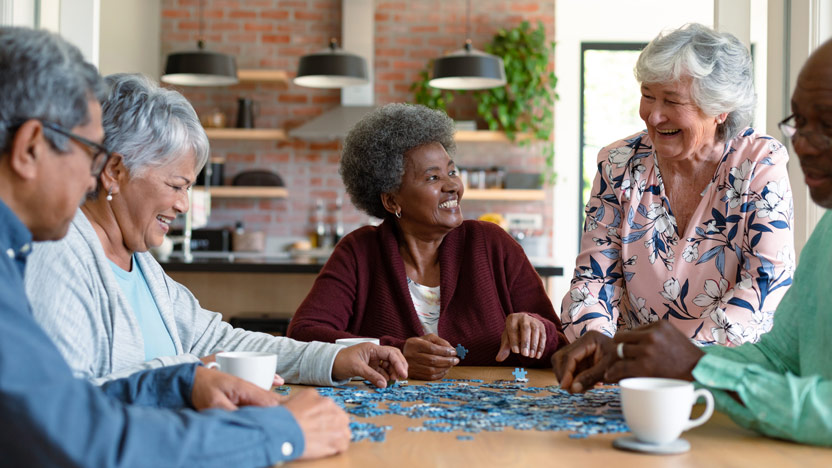What Is Assisted Living?
When looking at types of care for yourself or a senior loved one, you may wonder what the difference is between the options for senior living. In this blog, we answer the question, “What is assisted living?” Assisted living is one of the most common types of senior living options, with more than 30,000 assisted living communities nationwide. More than 800,000 Americans live in assisted living communities, and the average age for assisted living is 85 and older, predominantly female and primarily non-Hispanic white.
To qualify for assisted living, residents will need assistance with everyday tasks. When transitioning into assisted living, most residents need assistance with only a few activities of daily living and do not require around-the-clock skilled nursing care. The most frequent need is help with bathing, followed by walking assistance.
What Is Assisted Care?
Assisted care involves living in a senior living community that caters to individuals who may need help with daily activities. It serves as a middle ground between independent living and the full-time medical care provided in hospitals or nursing homes. This setup offers seniors a supportive environment that respects their desire for autonomy while ensuring they receive the necessary assistance to maintain a fulfilling lifestyle.
In assisted living communities, the emphasis is on creating an atmosphere that promotes independence and overall well-being. These communities offer more than just physical assistance; they also focus on fostering a vibrant social, emotional and mental environment where seniors can thrive. This living arrangement addresses practical needs while also providing a holistic approach to aging with dignity and grace.
Assisted living for adults is ideal for seniors seeking a balance between independence and support. It reflects a commitment to preserving each resident’s dignity and individuality while ensuring they have access to the care and assistance tailored to their unique needs.
What Are the Six Activities of Daily Living (ADLs)?
The six primary activities of daily living (ADLs) are essential tasks that include bathing, dressing, toileting, transferring, eating and maintaining continence. As individuals age, these activities can become increasingly difficult to manage independently, making the support provided by an assisted living community invaluable. Assisted living communities offer round-the-clock assistance with these daily tasks, ensuring that residents receive the help they need while maintaining as much independence as possible.
Some assisted living benefits are the access to a dedicated caregiving team that provides daily assistance with ADLs. These assisted living caregivers allow residents to maintain a sense of autonomy while receiving the necessary care to live comfortably. In addition to personal care, assisted living caregivers in these communities also assist with medication management, ensuring that residents take their medications as prescribed.
Housekeeping, laundry and cleaning services are typically included in the monthly fee at assisted living communities, relieving residents of tasks that may become challenging or unsafe over time. This helps residents focus on enjoying their lives without the stress of managing these daily chores.
Another significant advantage of assisted care is the exceptional dining experience it offers. These communities provide meals tailored to various dietary needs and restrictions, allowing residents to enjoy nutritious and comforting meals without the burden of meal planning and preparation. When assisted living is needed, cooking can become increasingly difficult, so having access to well-balanced meals supports their health and well-being.
Family-style dining in assisted living communities also promotes social interaction, giving residents the opportunity to form new friendships and reduce feelings of isolation. Sharing meals with others can create a sense of community and belonging, which is essential for emotional well-being.
Finally, the 24/7 caregiving and support available in assisted living communities further enhance the overall quality of life for residents. These communities empower seniors to maintain their independence while providing a supportive and welcoming environment where they can thrive.
Signs It’s Time to Consider Assisted Living
Recognizing when an aging parent may need additional help with daily activities involves assessing several key factors. Below are some benefits of assisted living and signs that it might be time to consider a move:
- Difficulty with activities of daily living (ADLs): If a senior struggles to independently complete all six ADLs – bathing, dressing, toileting, transferring, eating and maintaining continence – it may indicate the need for the extra support provided in an assisted living environment.
- Safety concerns: Issues like the risk of falls or forgetfulness can be better managed in an assisted living community, where assisted living caregivers are available 24/7 to ensure residents’ safety and well-being.
- Challenges in managing household tasks: Managing responsibilities such as paying bills, maintaining the home, cleaning and cooking can become overwhelming for seniors. Assisted living communities offer support for these tasks, allowing residents to focus on enjoying life.
- Caregiver burnout: Relying on in-home caregivers can lead to burnout, especially as a senior’s care needs increase. Transitioning to an assisted living community can alleviate the pressure on family caregivers and provide consistent, professional care.
- Isolation and loneliness: Spending most of the day alone can lead to feelings of loneliness and isolation. Senior living communities can provide seniors with ample opportunities for socialization through engaging activities and communal dining, helping residents stay connected and emotionally fulfilled.
Interested in learning more? We would love to host you for a casual visit where we can show you what sets us apart from other communities.

